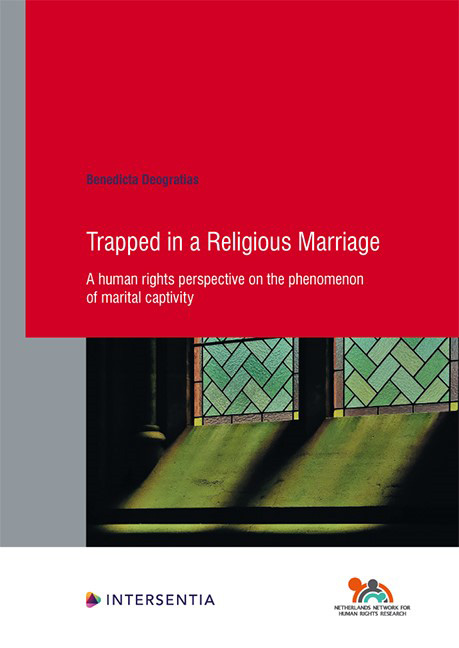Book contents
- Frontmatter
- Contents
- List of Frequently Used Abbreviations
- Chapter 1 Introduction to Marital Captivity
- Chapter 2 Religious Barriers to Divorce
- Chapter 3 Marital Captivity in the Netherlands
- Chapter 4 Marital Captivity and the Freedom of Religion
- Chapter 5 The Right to Divorce
- Chapter 6 The Trapped Spouse’s Rights
- Chapter 7 Violence Against Women
- Chapter 8 Conclusions
- Bibliography
- Curriculum Vitae
- Human Rights Research Series
Chapter 2 - Religious Barriers to Divorce
Published online by Cambridge University Press: 22 December 2020
- Frontmatter
- Contents
- List of Frequently Used Abbreviations
- Chapter 1 Introduction to Marital Captivity
- Chapter 2 Religious Barriers to Divorce
- Chapter 3 Marital Captivity in the Netherlands
- Chapter 4 Marital Captivity and the Freedom of Religion
- Chapter 5 The Right to Divorce
- Chapter 6 The Trapped Spouse’s Rights
- Chapter 7 Violence Against Women
- Chapter 8 Conclusions
- Bibliography
- Curriculum Vitae
- Human Rights Research Series
Summary
Maryam marries a man in accordance with religious customs. About a year later, a civil marriage is also concluded in accordance with the domestic law of the Netherlands. Years later the marriage starts to deteriorate, and this eventually leads to a civil divorce. However, succumbing to the pressure from her family and the church, Maryam decides to remain in and maintain the marital life with her former partner, despite being civilly divorced. Eventually, the couple stops living together. Wanting to also terminate the religious marriage Maryam also requests, from the competent religious authorities, documents confirming that the religious marriage has been terminated. Eventually, she manages to secure these documents. Now she expresses that she really feels that she is finally divorced from her ex-husband. For Maryam it was important to also have dissolved the religious marriage in accordance with the religious norms on divorce.
As disheartening and draining as the process of going through a divorce may be, this extract shows the significance the involved spouses and their social community may attach to a religious marriage. Spouses may be expected, both by the religious community as well as by themselves, to abide by their marital obligations for as long as the religious marriage has not yet been terminated. Therefore, the ending of a marriage in accordance with religious rules does not only have significant meaning within the community and for the spouses, but it also has social and religious consequences. It liberates the spouses from the religious marriage and therefore dissolves any remaining marital ties that may exist between them. For this reason, spouses may feel inclined to obtain a religious divorce, even after they have obtained a civil divorce.
Marital captivity occurs in multiple religions. A study conducted in 2014 in the Netherlands, on the instructions of the Dutch Ministry of Social Affairs and Employment, revealed that most situations of marital captivity occur within Christian, Hindu, Jewish and Muslim communities. What is noteworthy is that this contribution reported a general estimation of between 447 and 1687 cases of marital captivity, between 2011 and 2012 in the Netherlands and, thus, between 224 and 844 cases each year.
- Type
- Chapter
- Information
- Trapped in a Religious MarriageA Human Rights Perspective on the Phenomenon of Marital Captivity, pp. 37 - 60Publisher: IntersentiaPrint publication year: 2020



